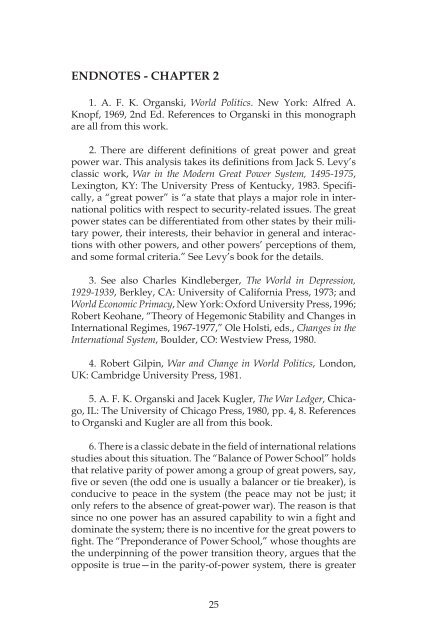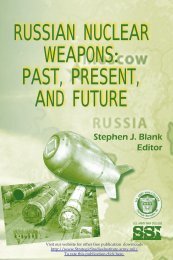The United States and China in Power Transition - Strategic Studies ...
The United States and China in Power Transition - Strategic Studies ...
The United States and China in Power Transition - Strategic Studies ...
You also want an ePaper? Increase the reach of your titles
YUMPU automatically turns print PDFs into web optimized ePapers that Google loves.
ENDNOTES - CHAPTER 2<br />
1. A. F. K. Organski, World Politics. New York: Alfred A.<br />
Knopf, 1969, 2nd Ed. References to Organski <strong>in</strong> this monograph<br />
are all from this work.<br />
2. <strong>The</strong>re are different def<strong>in</strong>itions of great power <strong>and</strong> great<br />
power war. This analysis takes its def<strong>in</strong>itions from Jack S. Levy’s<br />
classic work, War <strong>in</strong> the Modern Great <strong>Power</strong> System, 1495-1975,<br />
Lex<strong>in</strong>gton, KY: <strong>The</strong> University Press of Kentucky, 1983. Specifically,<br />
a “great power” is “a state that plays a major role <strong>in</strong> <strong>in</strong>ternational<br />
politics with respect to security-related issues. <strong>The</strong> great<br />
power states can be differentiated from other states by their military<br />
power, their <strong>in</strong>terests, their behavior <strong>in</strong> general <strong>and</strong> <strong>in</strong>teractions<br />
with other powers, <strong>and</strong> other powers’ perceptions of them,<br />
<strong>and</strong> some formal criteria.” See Levy’s book for the details.<br />
3. See also Charles K<strong>in</strong>dleberger, <strong>The</strong> World <strong>in</strong> Depression,<br />
1929-1939, Berkley, CA: University of California Press, 1973; <strong>and</strong><br />
World Economic Primacy, New York: Oxford University Press, 1996;<br />
Robert Keohane, “<strong>The</strong>ory of Hegemonic Stability <strong>and</strong> Changes <strong>in</strong><br />
International Regimes, 1967-1977,” Ole Holsti, eds., Changes <strong>in</strong> the<br />
International System, Boulder, CO: Westview Press, 1980.<br />
4. Robert Gilp<strong>in</strong>, War <strong>and</strong> Change <strong>in</strong> World Politics, London,<br />
UK: Cambridge University Press, 1981.<br />
5. A. F. K. Organski <strong>and</strong> Jacek Kugler, <strong>The</strong> War Ledger, Chicago,<br />
IL: <strong>The</strong> University of Chicago Press, 1980, pp. 4, 8. References<br />
to Organski <strong>and</strong> Kugler are all from this book.<br />
6. <strong>The</strong>re is a classic debate <strong>in</strong> the field of <strong>in</strong>ternational relations<br />
studies about this situation. <strong>The</strong> “Balance of <strong>Power</strong> School” holds<br />
that relative parity of power among a group of great powers, say,<br />
five or seven (the odd one is usually a balancer or tie breaker), is<br />
conducive to peace <strong>in</strong> the system (the peace may not be just; it<br />
only refers to the absence of great-power war). <strong>The</strong> reason is that<br />
s<strong>in</strong>ce no one power has an assured capability to w<strong>in</strong> a fight <strong>and</strong><br />
dom<strong>in</strong>ate the system; there is no <strong>in</strong>centive for the great powers to<br />
fight. <strong>The</strong> “Preponderance of <strong>Power</strong> School,” whose thoughts are<br />
the underp<strong>in</strong>n<strong>in</strong>g of the power transition theory, argues that the<br />
opposite is true—<strong>in</strong> the parity-of-power system, there is greater<br />
25

















